瑞丁英语初中语法chapter 10 倒装句(教师版)
- 格式:pdf
- 大小:224.81 KB
- 文档页数:5
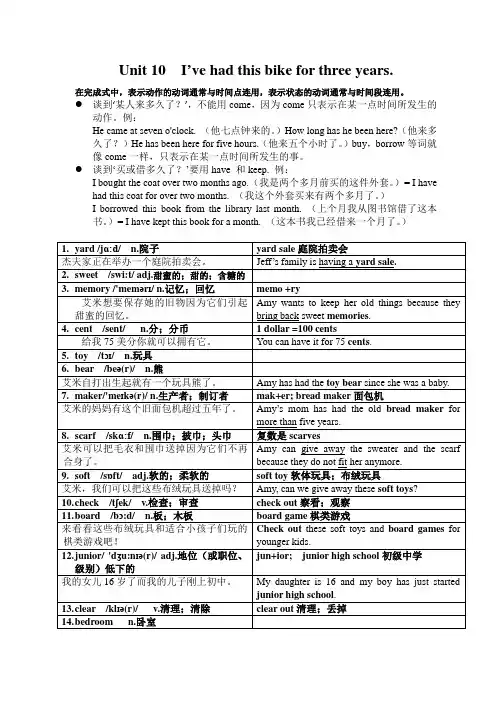
Unit 10 I’ve had this bike for three years.
在完成式中,表示动作的动词通常与时间点连用,表示状态的动词通常与时间段连用。
●谈到‘某人来多久了?’,不能用come,因为come只表示在某一点时间所发生的
动作。
例:
He came at seven o'clock. (他七点钟来的。
)How long has he been here?(他来多久了?)He has been here for five hours.(他来五个小时了。
)buy,borrow等词就像come一样,只表示在某一点时间所发生的事。
●谈到‘买或借多久了?’要用have 和keep. 例:
I bought the coat over two months ago.(我是两个多月前买的这件外套。
)= I have
had this coat for over two months. (我这个外套买来有两个多月了。
)
I borrowed this book from the library last month. (上个月我从图书馆借了这本
书。
)= I have kept this book for a month. (这本书我已经借来一个月了。
)。
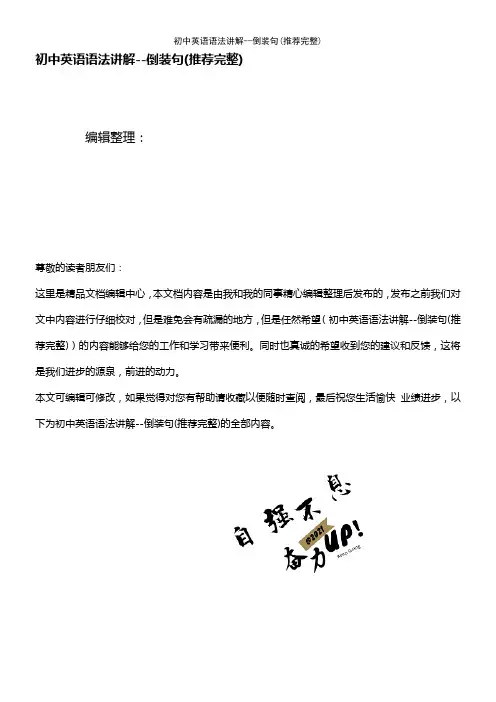
初中英语语法讲解--倒装句(推荐完整)编辑整理:尊敬的读者朋友们:这里是精品文档编辑中心,本文档内容是由我和我的同事精心编辑整理后发布的,发布之前我们对文中内容进行仔细校对,但是难免会有疏漏的地方,但是任然希望(初中英语语法讲解--倒装句(推荐完整))的内容能够给您的工作和学习带来便利。
同时也真诚的希望收到您的建议和反馈,这将是我们进步的源泉,前进的动力。
本文可编辑可修改,如果觉得对您有帮助请收藏以便随时查阅,最后祝您生活愉快业绩进步,以下为初中英语语法讲解--倒装句(推荐完整)的全部内容。
初中英语语法讲解—-倒装句(推荐完整)编辑整理:张嬗雒老师尊敬的读者朋友们:这里是精品文档编辑中心,本文档内容是由我和我的同事精心编辑整理后发布到文库,发布之前我们对文中内容进行仔细校对,但是难免会有疏漏的地方,但是我们任然希望初中英语语法讲解--倒装句(推荐完整) 这篇文档能够给您的工作和学习带来便利。
同时我们也真诚的希望收到您的建议和反馈到下面的留言区,这将是我们进步的源泉,前进的动力。
本文可编辑可修改,如果觉得对您有帮助请下载收藏以便随时查阅,最后祝您生活愉快业绩进步,以下为〈初中英语语法讲解--倒装句(推荐完整)> 这篇文档的全部内容。
初中英语语法讲解:倒装句定义为了强调、突出等语用目的而颠倒原有语序的句式叫做倒装句.在倒装句中,颠倒了的成分可以恢复原位而句意基本不变,句法成分不变。
英语倒装句(Inversion)主语和谓语是句子的核心,它们之间有两种语序:一是主语在谓语之前称为自然语序(Natural Order);二是主语在谓语之后则称为倒装语序(Inverted Order)。
而倒装语序中又有完全倒装(Full Inversion)和部分倒装(Partial Inversion)完全倒装(Full Inversion):又称“全部倒装”,是只将句子中的谓语动词全部置于主语之前。
此结构通常只用与一般现在时和一般过去时。
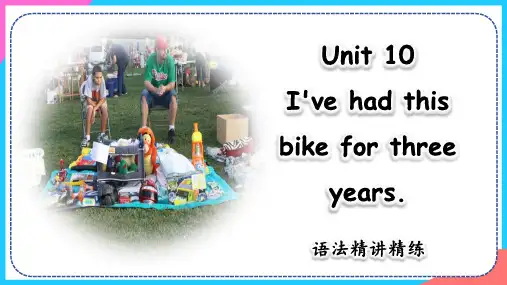
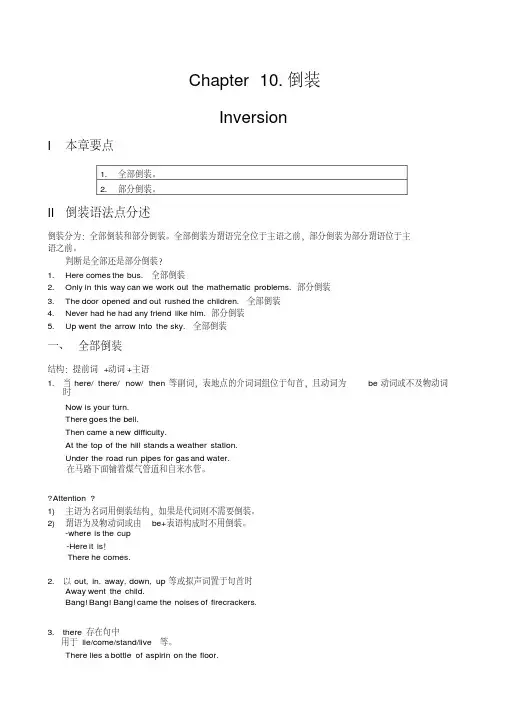
Chapter10.倒装InversionI本章要点1.全部倒装。
2.部分倒装。
II倒装语法点分述倒装分为:全部倒装和部分倒装。
全部倒装为谓语完全位于主语之前,部分倒装为部分谓语位于主语之前。
判断是全部还是部分倒装?1.Here comes the bus.全部倒装2.Only in this way can we work out the mathematic problems.部分倒装3.The door opened and out rushed the children.全部倒装4.Never had he had any friend like him.部分倒装5.Up went the arrow into the sky.全部倒装一、全部倒装结构:提前词+动词+主语1.当here/there/now/then等副词,表地点的介词词组位于句首,且动词为be动词或不及物动词时Now is your turn.There goes the bell.Then came a new difficulty.At the top of the hill stands a weather station.Under the road run pipes for gas and water.在马路下面铺着煤气管道和自来水管。
?Attention?1)主语为名词用倒装结构,如果是代词则不需要倒装。
2)谓语为及物动词或由be+表语构成时不用倒装。
-where is the cup-Here it is!There he comes.2.以out,in,away,down,up等或拟声词置于句首时Away went the child.Bang!Bang!Bang!came the noises of firecrackers.3.there存在句中用于lie/come/stand/live等。
There lies a bottle of aspirin on the floor.4.用作表语的形容词或分词置于句首时Very important in the peasants'life is the TV weather report.Gone are the days when one could just walk into a shop and buy one thing;no choice,no anxiety.二、部分倒装结构:提前词+情态动词/助动词/(be动词)+主语+动词1.疑问句Have you ever been there before?2.当neither,nor及so位于句首时,主语不同句型:so/neither/nor+be/助动词/情态动词+主语。
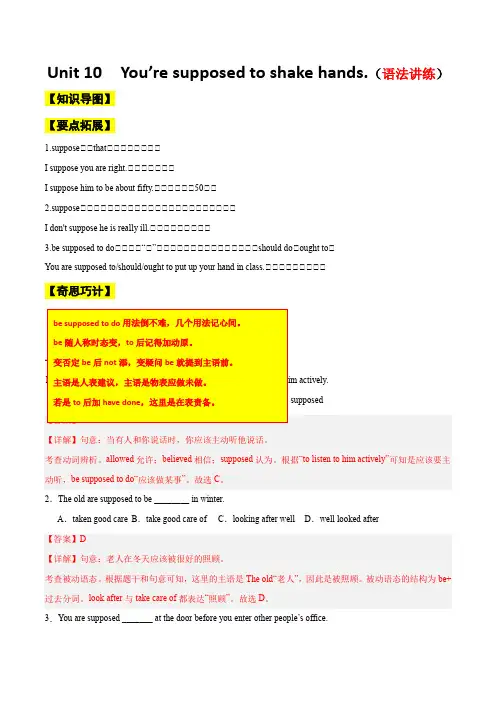
Unit 10 You’re supposed to shake hands.(语法讲练)【知识导图】【要点拓展】1.suppose后后that后后后后后后后后I suppose you are right.后后后后后后后I suppose him to be about fifty.后后后后后后50后后2.suppose后后后后后后后后后后后后后后后后后后后后后后后I don't suppose he is really ill.后后后后后后后后后3.be supposed to do后后后后“后”后后后后后后后后后后后后后后后should do后ought to后You are supposed to/should/ought to put up your hand in class.后后后后后后后后后【奇思巧计】A.taken good care B.take good care of C.looking after well D.well looked after【答案】D【详解】句意:老人在冬天应该被很好的照顾。
考查被动语态。
根据题干和句意可知,这里的主语是The old“老人”,因此是被照顾。
被动语态的结构为be+过去分词。
look after与take care of都表达“照顾”。
故选D。
3.You are supposed _______ at the door before you enter other people’s office.A.knock B.knocking C.knocked D.to knock【答案】D【详解】句意:你应该在进入别人的办公室之前先敲门。
考查动词短语。
be supposed to do sth.“应该做某事”,固定用法。
故选D。
4.—Ann, you were supposed ________ here ten minutes ago.—Sorry, I was caught in the traffic.A.arrive B.arrived C.to arrive D.arriving【答案】C【详解】句意:——安,你应该十分钟前到的。
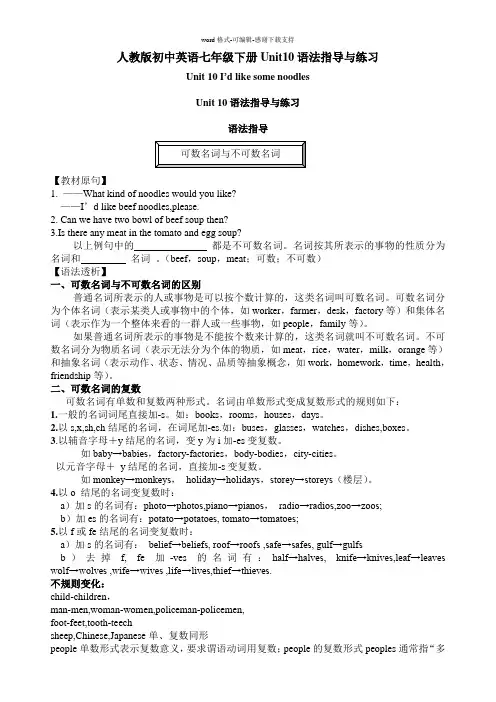
人教版初中英语七年级下册Unit10语法指导与练习Unit 10 I’d like some noodlesUnit 10语法指导与练习语法指导【教材原句】1. ——What kind of noodles would you like?——I’d like beef noodles,please.2. Can we have two bowl of beef soup then?3.Is there any meat in the tomato and egg soup?以上例句中的都是不可数名词。
名词按其所表示的事物的性质分为名词和名词。
(beef,soup,meat;可数;不可数)【语法透析】一、可数名词与不可数名词的区别普通名词所表示的人或事物是可以按个数计算的,这类名词叫可数名词。
可数名词分为个体名词(表示某类人或事物中的个体,如worker,farmer,desk,factory等)和集体名词(表示作为一个整体来看的一群人或一些事物,如people,family等)。
如果普通名词所表示的事物是不能按个数来计算的,这类名词就叫不可数名词。
不可数名词分为物质名词(表示无法分为个体的物质,如meat,rice,water,milk,orange等)和抽象名词(表示动作、状态、情况、品质等抽象概念,如work,homework,time,health,friendship等)。
二、可数名词的复数可数名词有单数和复数两种形式。
名词由单数形式变成复数形式的规则如下:1.一般的名词词尾直接加-s。
如:books,rooms,houses,days。
2.以s,x,sh,ch结尾的名词,在词尾加-es.如:buses,glasses,watches,dishes,boxes。
3.以辅音字母+y结尾的名词,变y为i加-es变复数。
如baby→babies,factory-factories,body-bodies,city-cities。
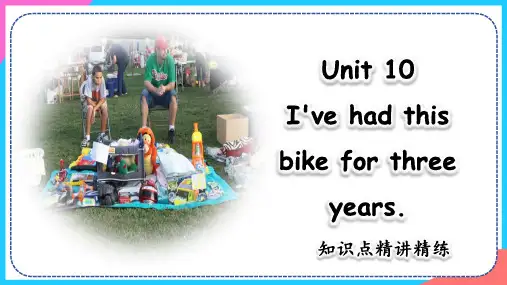
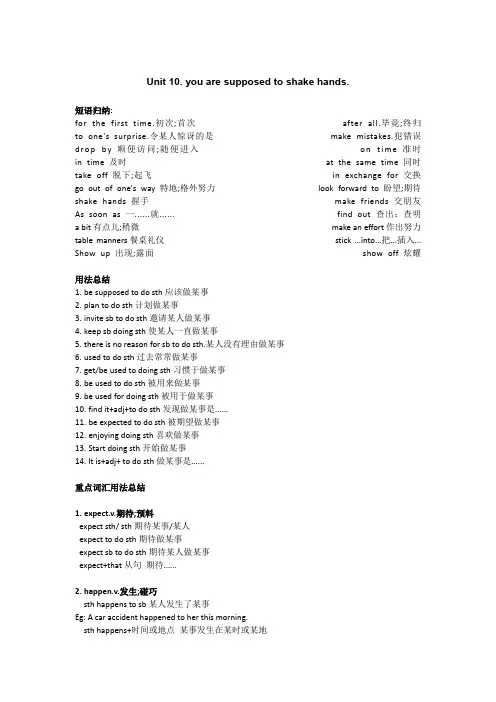
Unit 10. you are supposed to shake hands.短语归纳:for the first time.初次;首次after all.毕竟;终归to one's surprise.令某人惊讶的是make mistakes.犯错误d r op b y顺便访问;随便进入o n t i m e准时in time及时at the same time同时take off脱下;起飞in exchange for交换go out of one's way特地;格外努力look forward to盼望;期待shake hands握手make friends 交朋友As soon as一......就...... find out查出;查明a bit有点儿;稍微make an effort作出努力table manners餐桌礼仪stick ...into...把...插入... Show up出现;露面show off炫耀用法总结1.be supposed to do sth应该做某事2.plan to do sth计划做某事3.invite sb to do sth邀请某人做某事4.keep sb doing sth使某人一直做某事5.there is no reason for sb to do sth.某人没有理由做某事ed to do sth过去常常做某事7.get/be used to doing sth习惯于做某事8.be used to do sth被用来做某事9.be used for doing sth被用于做某事10.find it+adj+to do sth发现做某事是......11.be expected to do sth被期望做某事12.enjoying doing sth喜欢做某事13.Start doing sth开始做某事14.It is+adj+ to do sth做某事是......重点词汇用法总结1.expect.v.期待;预料expect sth/ sth期待某事/某人expect to do sth期待做某事expect sb to do sth期待某人做某事expect+that从句期待......2.happen.v.发生;碰巧sth happens to sb某人发生了某事Eg: A car accident happened to her this morning.sth happens+时间或地点某事发生在某时或某地Eg: The story happened in 2017.sb happens to do sth某人碰巧做某事I happened to meet a friend of mine in the street yesterday.3.易混辨析happen与take placehappen 指具体客观事件发生,有偶然性,未能预见take place指根据安排或计划发生含有事先预料或准备的意思注意:两者都不用于被动语态Eg: We can't know for sure what will happen.The class meeting will take place this Friday.4.return.v.回应;回报return sth to把某物还给......return to+地点返回某地Eg: Please return the books to the library on time.Allison decided to return home.5.to one's surprise.令某人惊讶的是surprise在此处作名词,意为“惊讶;惊奇”常用短语还有in surprise“惊讶地”give sb surprise “让某人吃惊”。
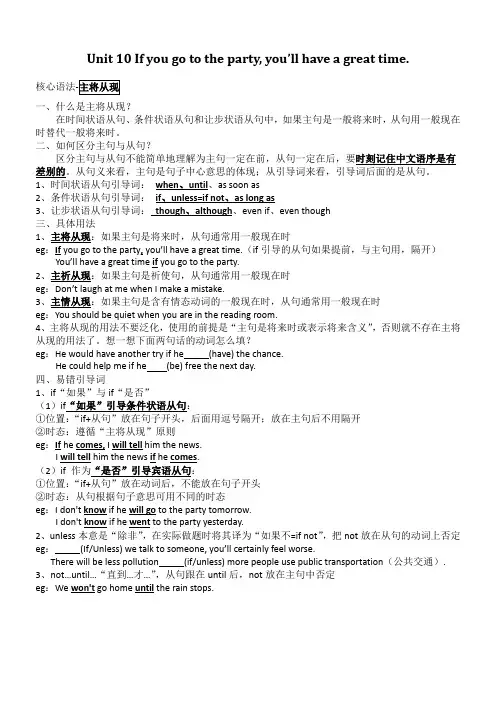
Unit 10 If you go to the party, you’ll have a great time.核心语法一、什么是主将从现?在时间状语从句、条件状语从句和让步状语从句中,如果主句是一般将来时,从句用一般现在时替代一般将来时。
二、如何区分主句与从句?区分主句与从句不能简单地理解为主句一定在前,从句一定在后,要时刻记住中文语序是有差别的。
从句义来看,主句是句子中心意思的体现;从引导词来看,引导词后面的是从句。
1、时间状语从句引导词:when、until、as soon as2、条件状语从句引导词:if、unless=if not、as long as3、让步状语从句引导词:though、although、even if、even though三、具体用法1、主将从现:如果主句是将来时,从句通常用一般现在时eg:If you go to the party, you’ll have a great time.(if引导的从句如果提前,与主句用,隔开)You’ll have a great time if you go to the party.2、主祈从现:如果主句是祈使句,从句通常用一般现在时eg:Don’t laugh at me when I make a mistake.3、主情从现:如果主句是含有情态动词的一般现在时,从句通常用一般现在时eg:You should be quiet when you are in the reading room.4、主将从现的用法不要泛化,使用的前提是“主句是将来时或表示将来含义”,否则就不存在主将从现的用法了。
想一想下面两句话的动词怎么填?eg:He would have another try if he (have) the chance.He could help me if he (be) free the next day.四、易错引导词1、if“如果”与if“是否”(1)if“如果”引导条件状语从句:①位置:“if+从句”放在句子开头,后面用逗号隔开;放在主句后不用隔开②时态:遵循“主将从现”原则eg:If he comes, I will tell him the news.I will tell him the news if he comes.(2)if 作为“是否”引导宾语从句:①位置:“if+从句”放在动词后,不能放在句子开头②时态:从句根据句子意思可用不同的时态eg:I don't know if he will go to the party tomorrow.I don't know if he went to the party yesterday.2、unless本意是“除非”,在实际做题时将其译为“如果不=if not”,把not放在从句的动词上否定eg:(If/Unless) we talk to someone, you’ll certainly feel worse.There will be less pollution(if/unless) more people use public transportation(公共交通). 3、not…until…“直到…才…”,从句跟在until后,not放在主句中否定eg:We won't go home until the rain stops.1、meet“遇见”:(考点1)变名词meeting“会议”,a class meeting“班会”、have a meeting“开会”2、video“录像”:(考点1)变复数videos,不要加es,watch a video“看录像”3、upset“失望;难过”(考点1)be upset about sth“对某事失望;心烦”,be upset with sb“对某人失望;不满意”,如Mary was not upset about the gift you gave her, but she was upset with you.(考点2)在写作时用upset替代sad、unhappy、unpleasant等词4、advice“建议”(考点1)advice不可数名词,a piece of advice“一条建议”、give sb some advice about sth“给某人关于某事的一些建议”、get advice from sb“从某人处得到建议”(考点2)变动词advise,advise doing sth,如Police advise staying at home.advise sb to do sth,如Police advise people to stay at home.advise that sb (should) do,如Police advise that people (should) stay at home.5、normal“正常的”:(考点1)变副词normally6、certain“确定的”:(考点1)变副词certainly7、angry“生气的”(考点1)be angry at/about sth,如The visitors were angry about the bad service.be angry with sb,如I was very angry with myself for making such a careless mistake.(考点2)比较级、最高级:angrier、angriest,也可用more angry、most angry(考点3)变副词angrily8、understand“理解”:(考点1)过去式understood(考点2)变形容词understanding“善解人意的”9、mistake“错误”:(考点1)make a mistake、make mistakes“犯错误”10、solve“解决”:(考点1)solve the problem“解决问题”、answer the question“回答问题”11、step“步骤”:(1)Step One=the first step“第一步”(2)step by step“一步一步地”12、experience:(考点1)“经验”不可数名词、“经历”可数名词13、half“一半”(考点1)in half“分成两半”、half an hour“半小时”、one and a half hours=an hour and a half“一个半小时”(考点2)be/go halfway to doing sth“部分地达到”,to是介词后接doing14、else“其他的”(考点1)放在复合不定代词、what之后,如Ask somebody else to help you.15、重点句型too…to…“太…而不能…”,如They will be too lazy to cook.16、重点句型It takes sb时间/钱to do sth“花费某人…做某事”,如It will take me too long to walk to the party.17、非谓语动词(1)to do作,如The first step is to find some you trust to talk to.(2)特殊疑问词+to do作,如The students are talking about when to have a party.(3)作,动词用,如(take)to someone (help) a lot.18、keep短语:keep…to oneself“保密”、keep doing sth“反复做某事”、keep on doing sth“持续做某事”、keep+形容词“(系动词)保持…”19、care(考点1)变形容词careful、careless、变副词carefully、carelessly(考点2)短语:take care of=look after“照顾”、Take care!=Be careful!“当心!”、care about“关心”20、短语过得愉快have a great time举办一场聚会have a party在…有问题have problems with sth 赚钱make money上大学go to collage乘公交车去某地take the bus to sp 要求某人做某事ask sb to do sth 环球旅行travel around the world 从某地逃跑run away from sp与某人打架get into a fight with sb 接受教育get an education向某人说抱歉say sorry to sb不敢做某事be afraid to do sth最后in the end=at last。
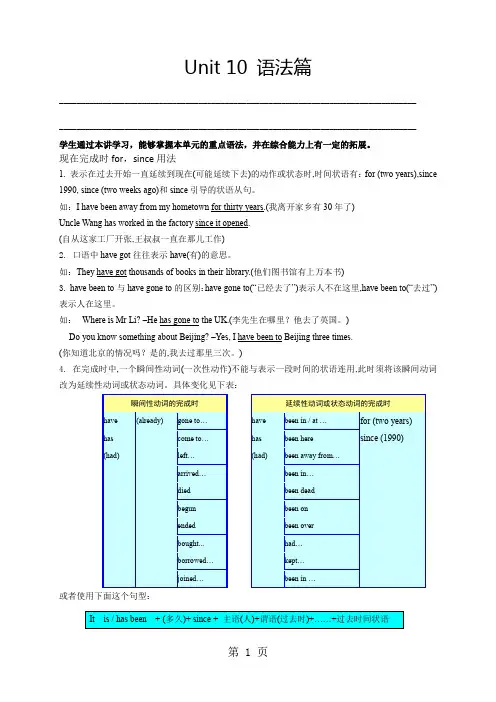
Unit 10 语法篇____________________________________________________________________________________________________________________________________________________________________学生通过本讲学习,能够掌握本单元的重点语法,并在综合能力上有一定的拓展。
现在完成时for,since用法1. 表示在过去开始一直延续到现在(可能延续下去)的动作或状态时,时间状语有:for (two years),since 1990, since (two weeks ago)和since引导的状语从句。
如:I have been away from my hometown for thirty years.(我离开家乡有30年了)Uncle Wang has worked in the factory since it opened.(自从这家工厂开张,王叔叔一直在那儿工作)2. 口语中have got往往表示have(有)的意思。
如:They have got thousands of books in their library.(他们图书馆有上万本书)3. have been to与have gone to的区别:have gone to(“已经去了”)表示人不在这里,have been to(“去过”)表示人在这里。
如:--Where is Mr Li? –He has gone to the UK.(李先生在哪里?他去了英国。
)--Do you know something about Beijing? –Yes, I have been to Beijing three times.(你知道北京的情况吗?是的,我去过那里三次。
)4. 在完成时中,一个瞬间性动词(一次性动作)不能与表示一段时间的状语连用,此时须将该瞬间动词改为延续性动词或状态动词。
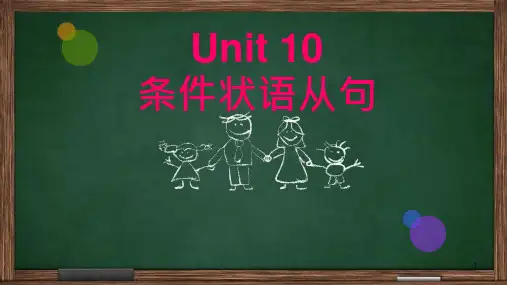
If you have a robot, what will you do?You can answer like this: If I have a robot, I will let itI think I will go to the movies tonight. If I go to the movies, Iwon’t finish my homework. If I don’t finish my homework…T: I’ll show you an example.If I don’t finish my homework, I won’t pass my test. If Idon’t pass my test, my parents will be upset.T: Please practice with your partners, you may use thesepictures as help if necessary.(具体操作方法:以小组为单位讨论,由组长给出最后的答案,然后统计各组长的讨论结果,评出最好的,并授予本班的金鸡奖。
这一部分是3b 的一种变式练习)Step 8 SummaryT: Could you sum up what we have learned in this class?if条件状语从句中,遵循的时态规律组,并设立奖项激发学生的学习兴趣,学生在口头表达的同时充分运用所学语法内容。
Unit 10 If you go to the party, you’llhave a great time?Section A (Grammar Focus-3c)教学设计单位:兰州新区中川中学年级:八年级姓名:彭渊嘉日期:2017年6月25日。
语法单词语法if 引导的条件状语从句1. if 意为“如果”,引导条件状语从句时,既可放在主句前面,也可放在主句后面。
若if条件句放在句首,从句后面要加逗号与主句隔开。
If you go there, I'll go, too.如果你去那儿,我也会去。
My mother will take me to the park if she is free.如果我妈妈有空,她就会带我去公园。
2. 时态运用:在含有if 引导的条件状语从句的主从复合句中,主句为下列情形之一的,条件状语从句通常用一般现在时。
(1) 主句是一般将来时,即遵循“主将从现”的原则。
If he comes, he will bring his violin.如果他来,就会带上他的小提琴。
(2) 主句是含有情态动词的句子,如may/might/can/must/should在含有if 引导的条件状语从句的主从复合句中,条件状语从句通常用一般现在时,即遵循“主情从现”的原则。
If you want to lose weight, you must eat less bread.You can get good grades if you study hard.如果你努力学习,你可以取得好成绩。
If you drive too fast, you may have an accident.如果你超速驾驶,就可能会出交通事故。
如果你想减肥,就必须少吃面包。
(3) 主句是祈使句。
If you are not strong enough, please don't take part in such an activity.如果你不是很健壮,请不要参加这种活动。
3. 句型转换:(1) 借助“祈使句+and/or+陈述句(一般将来时)”这一句型来转换。
其中,在句意上and 表示顺承;or表示转折,意为“否则”。
If you work hard, you'll pass the exam easily.=Work hard, and you'll pass the exam easily.努力学习,你将很容易通过考试。
Chapter10.倒装InversionI本章要点1.全部倒装。
2.部分倒装。
II倒装语法点分述倒装分为:全部倒装和部分倒装。
全部倒装为谓语完全位于主语之前,部分倒装为部分谓语位于主语之前。
判断是全部还是部分倒装?1.Here comes the bus.全部倒装2.Only in this way can we work out the mathematic problems.部分倒装3.The door opened and out rushed the children.全部倒装4.Never had he had any friend like him.部分倒装5.Up went the arrow into the sky.全部倒装一、全部倒装结构:提前词+动词+主语1.当here/there/now/then等副词,表地点的介词词组位于句首,且动词为be动词或不及物动词时Now is your turn.There goes the bell.Then came a new difficulty.At the top of the hill stands a weather station.Under the road run pipes for gas and water.在马路下面铺着煤气管道和自来水管。
♥Attention♥1)主语为名词用倒装结构,如果是代词则不需要倒装。
2)谓语为及物动词或由be+表语构成时不用倒装。
-where is the cup-Here it is!There he comes.2.以out,in,away,down,up等或拟声词置于句首时Away went the child.Bang!Bang!Bang!came the noises of firecrackers.3.there存在句中用于lie/come/stand/live等。
There lies a bottle of aspirin on the floor.4.用作表语的形容词或分词置于句首时Very important in the peasants'life is the TV weather report.Gone are the days when one could just walk into a shop and buy one thing;no choice,no anxiety.二、部分倒装结构:提前词+情态动词/助动词/(be动词)+主语+动词1.疑问句Have you ever been there before?2.当neither,nor及so位于句首时,主语不同句型:so/neither/nor+be/助动词/情态动词+主语。
肯定:—She is interested in the story.她对这个故事感兴趣。
—So am I.我也是。
否定:—I won't do such a thing.我可不做这样的事。
—Neither will he.他也不会。
♥Attention♥so,neither开头的倒装句要与上句的时态保持一致。
—Peter doesn't like swimming.—Neither does Tom.★小试身手★单项选择。
1)--She likes collecting stamps.--_____A_____A.So do I.B.Neither do I.C.So I do.D.Neither I do.2)--Did you enjoy that trip?--I'm afraid not,and_____D_____.A.so didn't my classmatesB.my classmates don't tooC.neither do my classmatesD.neither did my classmates3.句首为含有否定意义的词时,包括否定副词,半否定副词,含否定词的连词,含否定词的介词短语,含有no的词组位于句首时not only…but also…,scarcely,never,not,little,seldom,rarely,hardly,few,hardly…when…,nosooner…than…,scarcely…when…At no time can we forget the interest of the people.I not I also kept it.Not only but I also kept it.♥Attention♥1)no sooner…than…,scarcely…when…,hardly…when…,主句倒装从句不倒,注意主句的时态。
She had no sooner gone out than a student came to visit her.No sooner had she gone out than a student came to visit her.2)not until主句倒装从句不倒。
Not until he arrived home did he find that this wallet had been stolen.4.only结构:only+副词/介词/状语从句+情态动词/助动词+主语+动词Only then did I realize that I had made a huge mistake.Only by this means can you do it well.Only when a child grows up does he understand his parents’intentions.★小试身手★1)I realize how precious the health is only when I am sick.Only when I am sick do I realize how precious the health is.2)Only by practicing a few hours every day_D___be able to master the language.A.you canB.can youC.you willD.will you3)If you don't go,neither__B__.A.will IB.do IC.I doD.I will4)No sooner___C_to the station____the train left.A.had I got,whenB.I had got,thanC.had I got,thanD.did I get,when5)Never in my life_B___such a thing.A.I have heard or have seenB.have I heard or seenC.I have heard or seenD.did I hear or see6)--Here__B__!Where is Xiao Liu?--There____.es the bus,is hees the bus,he isC.the bus comes,is heD.the bus comes,he is5.if虚拟条件句倒装(主句不倒从句倒)把if省略,Were/Should/Had提前+主语……If they were here now,they could help us.Were they here now,they could help us.If Bob had been here just now,Mary could have invited him to dance.Had Bob been here just now,Mary could have invited him to dance.6.当as引导让步状语从句,解释为“尽管”,必须倒装,though可倒也可不倒,although不可倒装,名词前的冠词要省略adj./n.+as+sub.+be/adv+as+sub.+v./v.+as+sub.+v.aux.(助动词不能漏)Although he is a child,he knows a lot.Child as/though he is,he knows a lot.Although the little boy walked very quietly,his mother still heard him.Quietly as the little boy walked,his mother still heard him.Although he tries,he never seems able to make it.Try as he does,he never seems able to make it.7.so(such)…that…的结果状语从句中,当so/such位于句首时(前倒后不倒)He was so frightened that he did not dare to move an inch.So frightened was he that he did not dare to move an inch.Human nature is such that a great many people are often willing to sacrifice higher pay for the privilege of becoming white-collar workers.Such is human nature,that a great many people are often willing to sacrifice higher pay for the privilege of becoming white-collar workers.许多人常常愿意放弃较高的薪水,以换取做白领工人的殊荣,此乃人之常情。
★小试身手★1.把以下句子改为倒装句1)The housing in the big city was so expensive that most people could only rent instead of buying.So expensive was the housing in the big city that most people could only rent instead of buying.2)The boy is not only working hard,but also very polite.Not only is the boy working hard,but he is also very polite.3)Although I am hard-working,it is still difficult to get to the top.Hard-Working as/though I am,it is still difficult to get to the top.4)We can succeed in doing something only by working hard.Only by working hard can we succeed in doing something.5)The weather was so fine that we all went out,lying in the sun.So fine was the weather that we all went out,lying in the sun.2.选择1)Such an excited mood_B____that he couldn't say a word.A.he hadB.did he haveC.he hasD.he did have2)So much of interest_C_______that most visitors simply run out of time before seeing it all.A.offers BeijingB.Beijing offersC.does Beijing offerD.Beijing does offer三、Review1.No sooner___B_____themselves in their seats in the theater________the curtain went up.A.they have settled;beforeB.had they settled;thanC.have they settled;whenD.they had settled;than2.I wonder if your girl friend will go to the ball.If she___B_____,so________mine.A.does;doesB.does;willC.will;doesD.would;will3.It’s necessary that not only__D______to see a doctor but also stay at home for a good sleep.A.Bob should goB.did Bob goC.Bob’s goingD.should Bob go4.In_____A___,but out________again.A.came the teacher;he wentB.came the teacher;went heC.did the teacher come;he wentD.the teacher came;went he5.It’s beyond description.Nowhere else in the world___A_____such a quiet,beautiful place.A.can there beB.you can findC.there can beD.can find you6.You can never use my computer.At no time__B______that machine.A.you should touchB.should you touchC.touch should youD.you touch7.Not until all the fish died in the river__A______how serious the pollution was.A.did the villagers realizeB.the villagers realizedC.the villagers did realizeD.didn’t the villagers realize8.His mother had talked to him for two hours while he was watching TV,but_____B_____.A.a little did he hearB.little did he hearC.little heard he D.a little heard he9.“We have to stop talking here.Listen,____A________!”“Hurry up,Or we’ll be late.’’A.There goes the bellB.There does the bell goC.There the bell goesD.Goes the bell there10.She didn’t come to the party last Sunday.____C_____she must have made the party more exciting.A.If she cameB.would she comeC.Had she comeD.Did she come11.Never in my life__B__such a thing.A.I have heard or have seenB.have I heard or seenC.I have heard or seenD.did I hear or see12._____the expense,I__B___to Italy.A.If it were not,goB.Were it not for,would goC.Weren't it for,will goD.If it hadn't been,would have gone13.Seldom______C______video games ever since they entered college.A.they have playedB.they playedC.have they playedD.they have played14._______A_______that Marie was able to set up new branches elsewhere.A.So successful her business wasB.So successful was her businessC.So her business was successfulD.So was her successful business15.Never before___A____in greater need of modern public transport than it is today.A.has this city beenB.this city has beenC.was this cityD.this city was16.Only in this way____C_____to make improvement in the operating system.A.you can hopeB.you did hopeC.can you hopeD.did you hope。